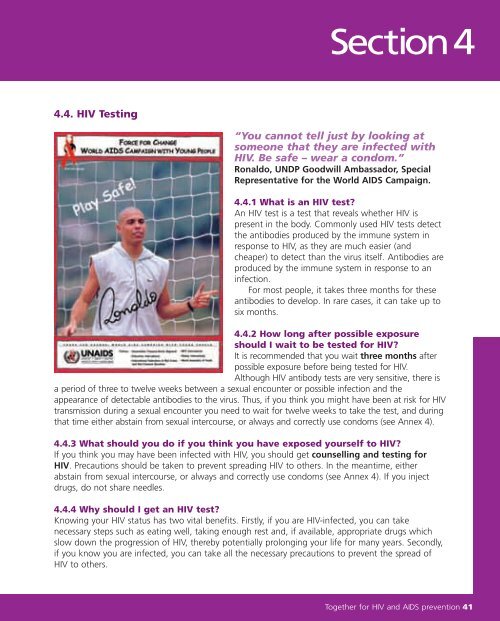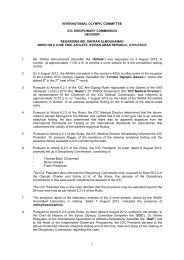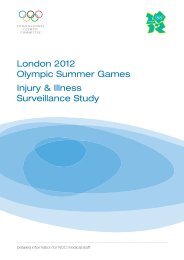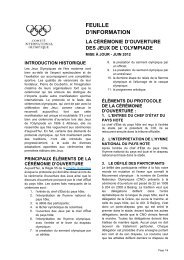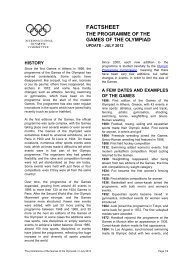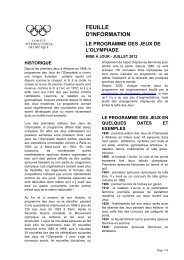Together for HIV and AIDS prevention
Together for HIV and AIDS prevention
Together for HIV and AIDS prevention
You also want an ePaper? Increase the reach of your titles
YUMPU automatically turns print PDFs into web optimized ePapers that Google loves.
4.4. <strong>HIV</strong> Testing<br />
Section4<br />
“You cannot tell just by looking at<br />
someone that they are infected with<br />
<strong>HIV</strong>. Be safe – wear a condom.”<br />
Ronaldo, UNDP Goodwill Ambassador, Special<br />
Representative <strong>for</strong> the World <strong>AIDS</strong> Campaign.<br />
4.4.1 What is an <strong>HIV</strong> test?<br />
An <strong>HIV</strong> test is a test that reveals whether <strong>HIV</strong> is<br />
present in the body. Commonly used <strong>HIV</strong> tests detect<br />
the antibodies produced by the immune system in<br />
response to <strong>HIV</strong>, as they are much easier (<strong>and</strong><br />
cheaper) to detect than the virus itself. Antibodies are<br />
produced by the immune system in response to an<br />
infection.<br />
For most people, it takes three months <strong>for</strong> these<br />
antibodies to develop. In rare cases, it can take up to<br />
six months.<br />
4.4.2 How long after possible exposure<br />
should I wait to be tested <strong>for</strong> <strong>HIV</strong>?<br />
It is recommended that you wait three months after<br />
possible exposure be<strong>for</strong>e being tested <strong>for</strong> <strong>HIV</strong>.<br />
Although <strong>HIV</strong> antibody tests are very sensitive, there is<br />
a period of three to twelve weeks between a sexual encounter or possible infection <strong>and</strong> the<br />
appearance of detectable antibodies to the virus. Thus, if you think you might have been at risk <strong>for</strong> <strong>HIV</strong><br />
transmission during a sexual encounter you need to wait <strong>for</strong> twelve weeks to take the test, <strong>and</strong> during<br />
that time either abstain from sexual intercourse, or always <strong>and</strong> correctly use condoms (see Annex 4).<br />
4.4.3 What should you do if you think you have exposed yourself to <strong>HIV</strong>?<br />
If you think you may have been infected with <strong>HIV</strong>, you should get counselling <strong>and</strong> testing <strong>for</strong><br />
<strong>HIV</strong>. Precautions should be taken to prevent spreading <strong>HIV</strong> to others. In the meantime, either<br />
abstain from sexual intercourse, or always <strong>and</strong> correctly use condoms (see Annex 4). If you inject<br />
drugs, do not share needles.<br />
4.4.4 Why should I get an <strong>HIV</strong> test?<br />
Knowing your <strong>HIV</strong> status has two vital benefits. Firstly, if you are <strong>HIV</strong>-infected, you can take<br />
necessary steps such as eating well, taking enough rest <strong>and</strong>, if available, appropriate drugs which<br />
slow down the progression of <strong>HIV</strong>, thereby potentially prolonging your life <strong>for</strong> many years. Secondly,<br />
if you know you are infected, you can take all the necessary precautions to prevent the spread of<br />
<strong>HIV</strong> to others.<br />
<strong>Together</strong> <strong>for</strong> <strong>HIV</strong> <strong>and</strong> <strong>AIDS</strong> <strong>prevention</strong> 41


